Using heat as well as ice packs are just two examples of the many easy options. Some, like acupuncture, must be performed by an expert. Consult your physician to find out which natural or home treatments could work best for you and if there are any restrictions on which ones you can use. Assuming they give you the go-light, you may start researching typical treatments by consulting with specialists for the first three on this list. Reports suggest that arthritis has been a problem for humans as far back as 4500 B.C. Traditional treatments for arthritis pain employed by our forebears include those beneficial in recent scientific trials for easing joint pain.
Natural Arthritis Treatment author and Dallas rheumatologist Scott Zashin MD warn against self-medication with herbal supplements and perhaps other alternative remedies before consulting with your primary care physician. He also recommends checking up with your doctor in a few months to see whether you can safely continue taking them. As inflammation is a hallmark of rheumatoid Arthritis (R.A.), supplementing your diet with anti-inflammatory herbs and condiments may only help. These food components probably won't help with R.A.'s symptoms.
What Exactly Is Arthritis?
As the most frequent form of arthritis, osteoarthritis is often just assumed when the word "arthritis" is used. Inflammation, soreness, and stiffness in the joints are symptoms reported by more than 16 million Americans over the age of 45. While there is currently no treatment for osteoarthritis, moderate symptoms can be controlled. Don't let yourself become uncomfortable; read on for some suggestions.
Top 4 Natural Treatments For Pain From Arthritis
Ginger
According to a study published in the journal of arthritis, the anti-inflammatory characteristics of ginger include its capacity to decrease inflammatory molecules called leukotrienes and to generate prostaglandins, which are hormone-like chemicals that induce pain and inflammation.In a study in the journal Genes in May 2019, 70 people with rheumatoid arthritis was given either 1,500 doses of turmeric powder or a placebo twice weekly for 12 weeks. This study's findings revealed that ginger's ability to alter the expression of particular genes might be responsible for its beneficial effects on R.A. symptoms. You may use fresh ginger in various ways, such as in a stir-fry with chicken or vegetables, in fresh pickled ginger, or grated form in soups and smoothies. Acupuncturist and Chinese herbalist Galina Roofener concurs that ginger can help relieve arthritis-related joint pain, and she suggests seeing a skilled herbalist as part of your treatment strategy.
Thyme

The use of thyme, an aromatic plant with powerful antioxidant properties, dates back thousands of years. In addition, studies published in Pharmacognosy Communications reveal that it possesses anti-inflammatory and anti-microbial effects, suggesting it may help treat rheumatoid arthritis pain. According to research published in Complementary Therapies in Treatment in December 2018, thyme is the most widely utilized herbal medicine among persons with R.A.
Turmeric
Turmeric, a golden spice, has been used for centuries to provide color and taste to food. It has also been used in Ayurveda and Chinese medicine to treat various diseases, such as arthritis and musculoskeletal disorders. According to studies published in August 2016 in the Journal of Medicinal Food, turmeric and curcumin (the critical component that gives turmeric its yellow color) have analgesic benefits and anti-inflammatory qualities.
Green Tea

Polyphenols, found in green tea, are powerful antioxidants that may help ease the symptoms of arthritis by lowering inflammation, protecting joints, and altering the immune system's reaction to the disease. Studies comparing the effects of green tea as well as black tea on arthritis found that green herbal extract was more efficient in reducing inflammation.
Conclusion
Humans have used plants as a source of medicine for nearly the entirety of our species' history. A Sumerian clay tablet dating back 5,000 years contains medicinal plant remedies, including the poppy, henbane, and mandrake, making it the oldest known example of using plants as medicine. Turmeric, ginger, Boswellia serrata, devil's claw, willow bark extract, and feverfew are only some of the herbal treatments for arthritis that are advocated today. To put it simply, not all herbal remedies are created equal. Some are exclusively sold in pill form. Some can be taken as a tea, while others as a pill or tincture. Turmeric, for instance, may be taken as a supplement and sold as a spice. Ginger can be taken as a pill, used as a cooking powder, or brewed into tea. Some herbs are better absorbed by the body when ingested, while others are more effective when steeped in liquid.







